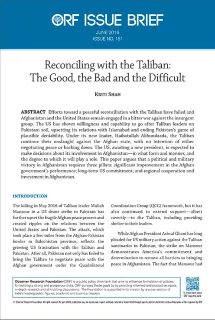Efforts toward a peaceful reconciliation with the Taliban have failed and Afghanistan and the United States remain engaged in a bitter war against the insurgent group. The US has shown willingness and capability to go after Taliban leaders on Pakistani soil, upsetting its relations with Islamabad and ending Pakistan’s game of plausible deniability. Under its new leader, Haibatullah Akhundzada, the Taliban continue their onslaught against the Afghan state, with no intention of either negotiating peace or backing down. The US, awaiting a new president, is expected to make decisions about its involvement in Afghanistan — in what form and manner, and the degree to which it will play a role. This paper argues that a political and military victory in Afghanistan requires three pillars: significant improvement in the Afghan government’s performance; long-term US commitment; and regional cooperation and investment in Afghanistan.
-
CENTRES
Progammes & Centres
Location

 PDF Download
PDF Download



 PREV
PREV


